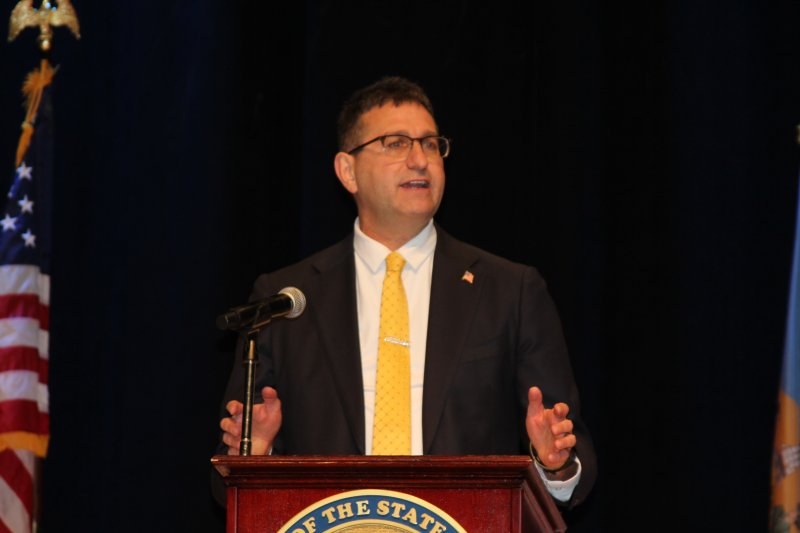Gov. Matt Meyer has vetoed a bill passed last legislative session that stripped Sussex County of its local control over retail marijuana shops.
Meyer released his explanation for the veto about 5 p.m., Aug. 28, saying while he supports “the goals of implementing a safe, equitable and accessible adult-use cannabis market in Delaware.” He added, “Displacing local land-use authority without offering any corresponding partnership or support is not how we build durable, effective policy or trust.
“If the goal is to ensure that retail cannabis establishments are accessible and successful across Delaware, a market that stands the test of time, then we should be working with our local governments as partners,” he said. “That includes exploring revenue-sharing to offset the local costs associated with zoning, permitting, enforcement and infrastructure. Preemption without support is not a sustainable path forward.”
His veto of Senate Bill 75 would need a three-fifths vote in both houses of the General Assembly to be overridden. The bill had enough votes for an override in both houses when voted on last session.
Along with his veto, Meyer included a draft bill giving the county and municipalities 4.5% of the total marijuana tax money collected in a prior month. He also included proposed revisions to existing Sussex County law, which he said Sussex County presented to his office.
“The revisions illustrate a specific set of policies that will move our state beyond the concerns that gave rise to Senate Bill 75,” he said.
Recreational marijuana for adults became legal Aug. 1 in the First State. To date, the only locations to buy recreational marijuana in Sussex County are former medical marijuana dispensaries that converted over to recreational stores.
Sen. Trey Paradee, D-Dover, who sponsored SB 75, wrote in a statement that he had struck a deal with Matt Meyer in late June.
“I agreed to support his initiative to allow the counties to share in the state’s revenue from recreational marijuana – a concept that I was very much opposed to. In return, the governor agreed to allow SB 75 to pass into law without his signature. Today, he backed out on his word by vetoing SB 75,” Paradee said.
“Matt’s decision will do irreparable harm to dozens of small business owners, who successfully won the lottery to open retail marijuana stores and grow facilities. Now, they have virtually nowhere to open their stores and facilities, and Sussex County will essentially become a ‘dry county.’ Some of the lottery ‘winners’ may go bankrupt or lose their life savings,” Paradee wrote.
Under existing state law, towns are given the option to ban establishments from town limits, but the county must allow for retail, manufacturing, testing and cultivating facilities under county-established zoning regulations.
In response, Sussex County passed an ordinance that allows retail stores only in the C-3 zoning district via a conditional use and prohibits retail stores within three miles of a town or city boundary, within three miles of another marijuana retail store or within three miles of a church, school, college or substance-abuse treatment facility.
The ordinance essentially banned retail stores in the county.
The state, through SB 75, would have set new standards for the county. Restrictions under the bill would have prohibited retail marijuana stores from operating within a half-mile of each other, and within 500 feet of a place of worship, school, licensed child care, residential treatment facility, park or library.
SB 63 vetoed
Meyer also vetoed Senate Bill 63, saying he is concerned bill’s intent to prevent wage theft could have detrimental effects on small businesses.
“While I understand that this legislation has good intentions, our state's labor law already requires general contractors to be legally and financially responsible for their subcontractors. Put simply, this bill fails to address the root cause of the problem, and likely will result in unintended negative consequences,” he wrote.
That bill passed by supermajority in the Senate, but not the House.
Upstate Democrat supporters of the wage bill, Sen. Jack Walsh and Rep. Ed Osienski, noted Meyer’s timing of vetoing a labor bill days before Labor Day.
“This legislation is designed to ensure fairness for those workers around the issues of income tax withholding, unemployment insurance, wage laws and workers’ compensation,” they wrote.
Editor’s note: The story has been updated with 3/5 majority needed to override a veto.
Melissa Steele is a staff writer covering the state Legislature, government and police. Her newspaper career spans more than 30 years and includes working for the Delaware State News, Burlington County Times, The News Journal, Dover Post and Milford Beacon before coming to the Cape Gazette in 2012. Her work has received numerous awards, most notably a Pulitzer Prize-adjudicated investigative piece, and a runner-up for the MDDC James S. Keat Freedom of Information Award.






















































